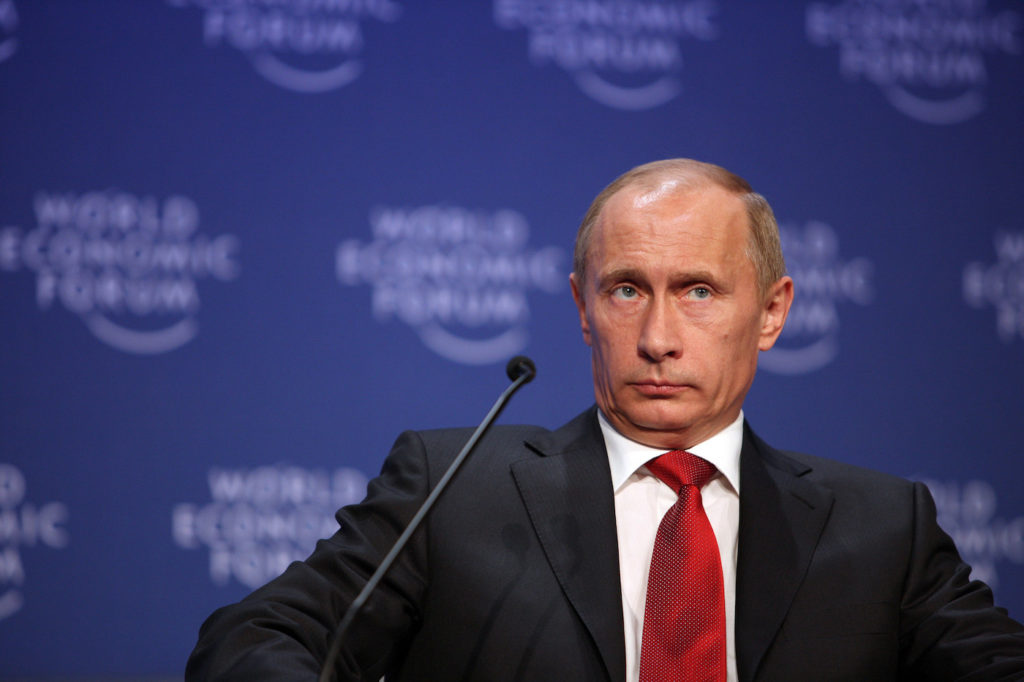The religious right, prior to Russia’s invasion of Ukraine at least, has displayed a surprising amount of sympathy for Russia and its leader. Some see Russia as a final bulwark against the evils of liquid modernity, progressivism, and wokeism. For them, Russia is a symbol of a fearless, unashamed Christian conservatism, one tethered to state power and willing to use it to accomplish holy ends.
This interpretation is found among some evangelicals. A 2018 article in Christianity Today noted that Russia’s intervention in Syria—and by extension the Assad regime that protects Christians—has led many American evangelicals to consider Russia the “good guys in the cradle of Christianity.” In 2015, evangelical leader Franklin Graham visited Russia and had a warm meeting with President Vladimir Putin, and the evangelical World Congress of Families maintains a close relationship Russian Christians. It is also popular among some conservative Catholics. Daily Wire contributor (and practicing Catholic) Michael Knowles in May 2021 lauded a Russian army ad campaign that “make[es] the woke U.S. army ads look utterly weak and pathetic.”
Should contemporary Russia really be placed upon a pedestal? For all of Putin’s rhetoric, it’s important to examine Russia’s trends in religion and morals before deeming it worthy of emulation.
Catholic professor Jason Morgan in a January 28 piece at Crisis Magazine also observes that “by many accounts (including his own), Putin is a Christian man leading a Christian people. . . . To put it bluntly, if God will be on some side in the Ukraine mess, then wouldn’t that be the side of the Christian armies?” Morgan further describes Russia as a “Christian powerhouse with a score to settle with history.” While much Putin praise has (perhaps temporarily) toned down since the Ukraine invasion commenced, it’s hard to ignore the religious right’s recent history of lavish and vocal admiration for Russia, even just days before Russia began its attack.
Start your day with Public Discourse
Sign up and get our daily essays sent straight to your inbox.Certainly Putin has sought to portray himself as a “defender of Christians,” exemplified in Russia’s defense of vulnerable Christian communities in Syria. He is also viewed as a partner of an increasingly besieged religious right in his upholding of conservative values such as opposition to LGBTQ+ rights, penalizing divorce, and supporting the “traditional family.” He often invokes the Russian Orthodox Church in his speeches, and has offered the church a more prominent position in Russian political life. This has been welcomed by conservative Christians: Graham enthusiastically praised Russia’s laws against “homosexual propaganda.” Pat Buchanan almost a decade ago asked whether Putin was a paleoconservative and “one of us.”
But should contemporary Russia really be placed upon a pedestal? For all of Putin’s rhetoric, it’s important to examine Russia’s trends in religion and morals before deeming it worthy of emulation.
Cultural Christianity
It’s true, at least, that perhaps as many as three-quarters of Russia’s people identify as Christian, most of them as Orthodox. This represents a pretty serious shift since the end of the Cold War, when only about a third of Russians identified as Orthodox. Yet only about six percent of the population attend church several times a month, and the number of Russians who attend Easter services has been declining in recent years. A 2014 Pew analysis acknowledged that this might simply mean that Russians now feel more comfortable expressing the beliefs they’ve always held: “It may be that after the fall of the U.S.S.R. in 1991, Russians felt freer to express the religious identities they had quietly maintained during the Soviet era.”
Whatever the reason for this chasm between religious affiliation and practice, it translates to an Orthodoxy that is more or less nominal. If Russian Orthodox Christians don’t even show up for church on Easter, it’s safe to conclude that faith isn’t terribly important to many of them. By contrast, though it’s true that church attendance in the United States is also declining, about a third of Americans still attend church several times a month. In other words, five times as many Americans as Russians attend church regularly.
Examining the prevalence of certain social disorders further illuminates the character of contemporary Russia. Consider ground zero of America’s culture wars: abortion. Though abortion rates in Russia have been going down for decades, Russia is still among the world’s leaders, with more than one abortion for every two live births. Moreover, analysts assess that the reason the abortion rate is going down isn’t because of increased opposition to it, but increased access to contraception. As a 1990 scholarly medical paper explained, abortion was the only widely available form of family planning for Russians under the Soviet Union. Though the country’s total fertility rate slightly increased over the last twenty years, it remains well below replacement level, indicating that serious obstacles remain to persuading Russians to have children.
While the United States also has a worsening fertility problem, the number of pregnancies ending in abortion is less than 20 percent, or almost half that of Russia. Like Russia, that rate is also declining, in part due to increased access to and use of contraception. Yet there is also significant grassroots opposition to abortion, evidenced perhaps most dramatically by the fact that twenty-six states are primed to end abortion if Roe v. Wade is overturned.
Other indicators point to the deep moral chaos that defines life for many Russians, far beyond what Americans typically experience. Russia’s alcoholism rate is one of the highest in the world—the average Russian over the age of fifteen drinks the equivalent of almost three gallons of pure ethanol every year (Americans drink quite a bit too, but again, almost half as much as Russians). Until the 1980s, the Russian government viewed alcohol as a strong source of state revenue, and thus did not police high levels of alcoholism. By then it was too late; heavy drinking was deeply imprinted on Russian society. There are no coherent nationwide programs to combat alcoholism, noted a 2013 article in the Atlantic.
There are other manifestations of social decay. Russia has one of the fastest growing rates of drug trafficking and drug abuse in the world, putting even our nation’s opioid epidemic in perspective. Domestic violence rates in Russia are so high it is often labeled a pandemic—“If he beats you, it means he loves you” is actually a common phrase in Russian society. The country’s divorce rate is the third highest in the world (following only the Maldives and Kazakhstan), and that rate has recently been growing. The most common reason given in Russia for divorce is poverty. Russia’s problems make America’s seem a bit less catastrophic.
Russia, Defender of Christians?
The other dimension to the American Christian conservative idealization of Russia regards its foreign policy. Moscow’s defense of the Assad regime, however pragmatic and self-serving, saved historic Christian communities in Syria, such Russian sympathizers will declare. Behind Russia’s schemes abroad is its aspiration to be the “Third Rome,” extending Orthodoxy across Eastern Europe and Central Asia, Western Russophiles will add. The reality is a bit more complicated, and suggests that Russia’s actions around the world have little to do with protecting (or expanding) Christianity.
In the western hemisphere alone, Russia uses military and economic support to empower socialist regimes that antagonize if not openly persecute Christians. In Cuba, Christian leaders are antagonized by the government, churches are regularly destroyed or seized (no new church buildings have been legally built in the country since the revolution), and access to Bibles is severely restricted. Former Venezuelan president Hugo Chávez called himself the true heir of Christ and dismissed the church’s bishops as perverts and degenerates, and his successor Nicolás Maduro has had a similarly antagonistic relationship with the Catholic Church. In Nicaragua, the government harasses Catholic clergy, and in August 2021 the vice president (the president’s wife) called Catholic bishops and priests “devils.” Russia has backed both Cuba’s and Nicaragua’s inhumane regimes.
Its allies elsewhere are not exactly paragons of religious liberty. They include China (one of the worst persecutors of Christians in the world), Armenia, Belarus, Kazakhstan, Kyrgyzstan, and Tajikistan. Apart from Armenia and Belarus, which are predominantly Orthodox, the other three central Asian states are predominantly Muslim, and Open Doors USA lists all as having a moderate or high degree of persecution of Christians.
A Cautionary Tale
Russia is no “Christian powerhouse.” That narrative is little more than an easily falsifiable propaganda campaign by its kleptocratic governing class. Russia struggles not only to preserve its ancient faith tradition—in spite of significant government expenditures to the Orthodox Church—but also to protect and preserve its families in the face of substance abuse, domestic violence, and unmitigated cronyism. It is a nation whose leaders promote a version of Russia that has very little to do with the reality of everyday Russian life.
Granted, in many respects, America is itself a post-Christian nation, evidenced perhaps most saliently in the large number of non-believers in her younger generations. But if the “Russia is a Christian powerhouse” narrative is accurate, we would expect it to be at least more religious and moral than the United States, her greatest global competitor. The opposite is in fact true.
Russia struggles not only to preserve its ancient faith tradition—in spite of significant government expenditures to the Orthodox Church—but also to protect and preserve its families in the face of substance abuse, domestic violence, and unmitigated cronyism.
What, then, is the lesson for Americans? Perhaps most importantly, just because the politicians (or leaders) of a country talk a big game about preserving and promoting the Christian faith, there is only so much a government can do to affect (or curb) broader social trends. Even if America still seems a more Christian nation than Russia, demographic trends suggest we are headed, within the next generation or two, to church attendance levels similar to those of Russia and much of Western Europe. And that, say many sociologists, will have disastrous sociological and economic consequences. If religious faith and practice are declining among a population, there’s little political leaders, even those motivated by noble motives, can do to reverse that.
This is all the more reason for Americans Christians to focus on their immediate “near abroad”—their families, their churches, and their communities. The available data show that when religious families are strong, their children are far more likely to maintain their faith. When those children see that nascent faith reinforced by those they meet at church and in their communities, they are more likely to either stay in the faith or return to it later in life. Sure, we should vote for politicians who seek to shore up Christian values in our states and nation. But we cannot count on them as a magic elixir in this secular age. As the psalmist says, “put not your trust in princes.”













